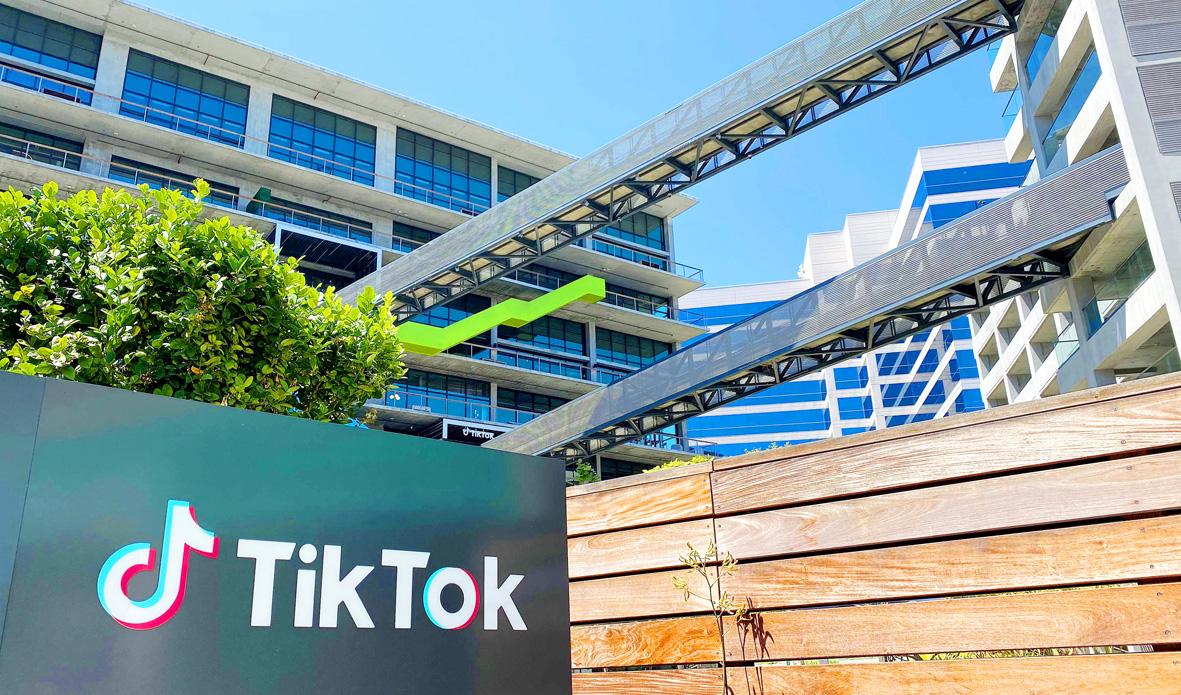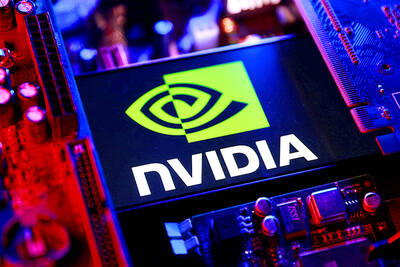US President Donald Trump on Friday ordered the Chinese owner of the popular music video app TikTok to sell its US assets, citing national security grounds and delivering the latest salvo in his standoff with Beijing.
Trump’s decision came after an investigation by the Committee on Foreign Investment in the US (CFIUS), which reviews proposed acquisitions of US businesses by overseas investors for national security concerns.
The unexpected order was tied to the committee’s timeline, people familiar with the decision said.

Photo: AFP
ByteDance Ltd (字節跳動) bought the app Musical.ly in 2017 and merged it with TikTok to create a single, integrated social media application. Trump’s order, in effect, called for a reversal of that transaction.
Through its ownership of Musical.ly, Beijing-based ByteDance “might take action that threatens to impair the national security of the United States,” Trump said in the order.
US Secretary of the Treasury Steven Mnuchin said in a statement that “CFIUS conducted an exhaustive review of the case and unanimously recommended this action to the president in order to protect US users from exploitation of their personal data.”
CFIUS, which is led by Mnuchin, includes officials from across 16 government departments and agencies, including the US departments of state, defense and commerce.
The White House referred questions on Friday’s decision to the Treasury Department.
On Saturday, Trump told reporters at his golf club in Bedminster, New Jersey, that other Chinese companies might come under his administration’s scrutiny.
Asked whether there are other companies he was looking at banning or restricting in the US, Trump said: “We’re looking at other things, yes.” He did not elaborate.
The order signed by Trump on Friday lays out a 90-day deadline for a possible sale of TikTok to a US buyer, which could be extended for as much as 30 days at the discretion of CFIUS.
ByteDance, its affiliates, and Chinese shareholders were also ordered to divest and destroy any data obtained or derived from TikTok or Musical.ly app users in the US.
Trump’s previous executive order would prohibit US persons and companies from doing business with TikTok effective 45 days from Aug. 6.
The twin dates offered by the administration suggest a buyer of TikTok’s US operations still faces a 45-day deadline to make a handshake deal, and would need to close that transaction to CFIUS’s satisfaction within 90 days of Trump’s latest order.
When asked to clarify the divergent deadlines, officials pointed to the earlier executive order.
“The original order was rushed and confused, so to me this is part cleanup, part justification and part anticipation of TikTok’s threat to sue,” University of Richmond law professor Carl Tobias said. “It’s intended to shore up the legality of what they are trying to do.”
A TikTok spokesperson pointed to an earlier statement in which it said it was “shocked by the recent executive order, which was issued without any due process” and that it intended to “pursue all remedies available to us in order to ensure that the rule of law is not discarded.”
The orders, and another one on Aug. 6 that singled out WeChat (微信), owned by China’s Tencent Holdings Ltd (騰訊), are consistent with the administration’s increasingly aggressive posture toward Chinese technology giants as relations with the Beijing government deteriorate and Trump faces a tough re-election campaign.
For TikTok, at least, there’s a potential way out of an all-out US ban through the sale of its US operations. Microsoft Corp said in a rare public blog post commenting on deal talks earlier this month that it was considering the purchase of the wildly popular music video app.
Negotiations are still ongoing and multiple people familiar with the deliberations say it is not a done deal.
Other US tech companies, including Twitter Inc, have also explored possible TikTok bids, but it is unclear how far those talks have gone, multiple people familiar with the deliberations said.
Large venture capital and private equity firms including Sequoia Capital and General Atlantic have billions of dollars on the line and are trying to make the sale of TikTok a more competitive process, which could drive the price higher, avoid a fire sale to Microsoft, and ensure TikTok ends up in the hands of the right bidder, one person involved in the discussions said.
Goldman Sachs Group Inc and Blackstone Group are among the financial firms that have been jostling for a role in any deal, but the attempts have not made headway, according to three people familiar with the deliberations.
Meanwhile, thorny issues around how to truly separate the algorithms and technology remain unresolved, three people involved in the deliberations said.
Microsoft and TikTok engineers are working together at a high level to figure out how to revise the code, separate the underlying technologies and plug any vulnerabilities, two of these people said.
CFIUS would not sign off on a sale unless it is satisfied there are not any unresolved security risks.

POWERING UP: PSUs for AI servers made up about 50% of Delta’s total server PSU revenue during the first three quarters of last year, the company said Power supply and electronic components maker Delta Electronics Inc (台達電) reported record-high revenue of NT$161.61 billion (US$5.11 billion) for last quarter and said it remains positive about this quarter. Last quarter’s figure was up 7.6 percent from the previous quarter and 41.51 percent higher than a year earlier, and largely in line with Yuanta Securities Investment Consulting Co’s (元大投顧) forecast of NT$160 billion. Delta’s annual revenue last year rose 31.76 percent year-on-year to NT$554.89 billion, also a record high for the company. Its strong performance reflected continued demand for high-performance power solutions and advanced liquid-cooling products used in artificial intelligence (AI) data centers,

SIZE MATTERS: TSMC started phasing out 8-inch wafer production last year, while Samsung is more aggressively retiring 8-inch capacity, TrendForce said Chipmakers are expected to raise prices of 8-inch wafers by up to 20 percent this year on concern over supply constraints as major contract chipmakers Taiwan Semiconductor Manufacturing Co (TSMC, 台積電) and Samsung Electronics Co gradually retire less advanced wafer capacity, TrendForce Corp (集邦科技) said yesterday. It is the first significant across-the-board price hike since a global semiconductor correction in 2023, the Taipei-based market researcher said in a report. Global 8-inch wafer capacity slid 0.3 percent year-on-year last year, although 8-inch wafer prices still hovered at relatively stable levels throughout the year, TrendForce said. The downward trend is expected to continue this year,

A proposed billionaires’ tax in California has ignited a political uproar in Silicon Valley, with tech titans threatening to leave the state while California Governor Gavin Newsom of the Democratic Party maneuvers to defeat a levy that he fears would lead to an exodus of wealth. A technology mecca, California has more billionaires than any other US state — a few hundred, by some estimates. About half its personal income tax revenue, a financial backbone in the nearly US$350 billion budget, comes from the top 1 percent of earners. A large healthcare union is attempting to place a proposal before

‘BASICALLY A BAN’: Sources said the wording governing H200 imports from officials was severe, but added that the regulations might change if the situation evolves Chinese customs authorities told customs agents this week that Nvidia Corp’s H200 artificial intelligence (AI) chips are not permitted to enter China, three people briefed on the matter said. Chinese government officials also summoned domestic technology companies to meetings on Tuesday, at which they were explicitly instructed not to purchase the chips unless necessary, two of the people and a third source said. “The wording from the officials is so severe that it is basically a ban for now, though this might change in the future should things evolve,” one of the people said. The H200, Nvidia’s second-most powerful AI chip, is one